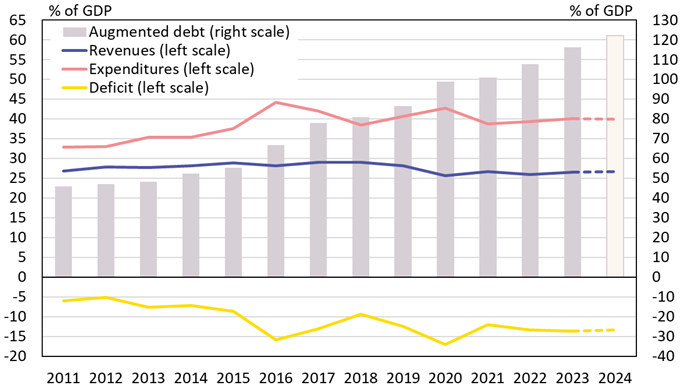BOFIT Weekly Review 08/2024
IMF calls for extensive reforms of Chinese economy
At the start of February, the International Monetary Fund (IMF) released its Article IV Consultation report for China. The IMF expects China’s GDP growth to slow gradually to around 3 % a year at the end of this decade as economic imbalances continue to widen. The IMF team reiterated China’s urgent need to implement serious structural reforms to improve its growth prospects and confront its economic imbalances. Productivity gains not only demand a reduction in state guidance and the role of state-owned enterprises, but also promotion of market-friendly reforms for business and the financial sector, as well as raising the retirement age. IMF models suggest such reforms could have a substantial positive impact on China’s long-term growth. Important measures to deal with structural imbalances include reducing the need for households to save for a rainy day by improving social safety nets and public services.
The Article IV report and related documents (selected issues) deal extensively with problems in the real estate sector. Among other things, the IMF has made projections for the real estate sector development. According to them, it might take until 2026 before the real estate investment return to (very moderate) growth and that the level of investments will remain far below the all-time highs of 2021. While provincial differences are significant, the construction activity outside Beijing and Shanghai over the next decade is estimated to be well below (by 30–55 %) the levels in 2012–2021. The slowing pace of urbanisation and China’s shrinking population have reduced the need for new construction projects. In addition, the need to replace existing housing has fallen due to substantial state-backed renovation projects during the last decade. Moreover, China’s 2020 census found that already two-thirds of the Chinese population lives in apartments built after 2000. The investment need is further reduced by large stocks of unsold new apartments and unfinished apartment buildings, as well as low occupancy rates in apartments purchased for investment purposes. Uncertainty about house price trends has also depressed available apartment supply and demand. The only trend currently increasing apartment demand is smaller family size.
The IMF also addresses the sustainability of public finances, particularly those of local governments. Last year’s government augmented deficit (central government and local governments), including debt incurred by off-budget local government financial vehicles (LGFVs), stayed around 14 % of GDP. According to IMF calculations, augmented debt in total now equals about 116 % of GDP. The IMF believes it is necessary for China to begin to “deleverage” its public economy. Immediate measures should include reducing the volume of local government off-budget investment projects and raising China’s extremely modest income tax. Although the IMF currently expects balances of local government off-budget activities to shrink slightly due to increasingly tight financing constraints, local governments still face a massive debt burden in coming years as the needs of the ageing population raise public spending pressure. The IMF projects China’s ratio of government debt to GDP to increase by roughly 5 percentage points a year.
IMF estimates of China’s government deficit and augmented debt
Sources: IMF and BOFIT.